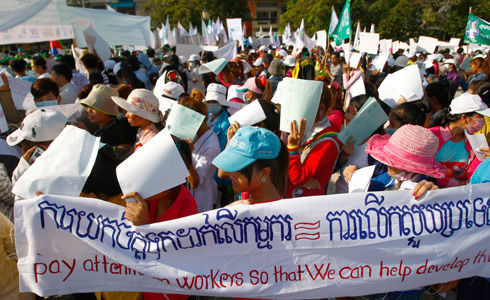
From the Guardian (a British newspaper):
At least 23 workers were hurt in Cambodia on Monday when police using stun batons moved in to end a protest over pay at a factory that makes clothing for Nike, a trade union representative said.
Police with riot gear were deployed to move about 3,000 mostly female workers who had blocked a road outside their factory… They want the US sportswear firm, which employs more than 5,000 people at the plant, to give them $14 a month to help pay for transport, rent and healthcare costs on top of their $74 minimum wage. (Read the full story here.)
Read that again. These are “minimum wage” workers, earning $74 a month. They are looking for a $14 a month raise.
But in America these days, those types of facts don’t really matter. It’s all about spin – and Nike’s been spinning this story since the beginning of the month.
Read the Business Insider’s “How Nike Solved its Sweatshop Problem” here.
Read the Portland Business Journal’s “For Nike, 25 years from sweatshops to reform” here.
Sure, they’ve got their “sweatshop problem” fixed. If not by their corporate PR department, then by the worldwide decline in industry standards.
Can’t help but notice:
The Sports Authority is selling Nike’s Hyper Elite Platinum Jerseys for $120.00 each.
PacSun is selling Nike’s Ruskin Pants for $119.99 each (that’s on markdown: they’re usually $160 each).
The NFL shop is selling Nike’s licensed team jackets for $139.99 each (yep, that’s almost two months’ wages, in Cambodia).
So it’s really no surprise: Nike’s profits are up – a whopping $866 million in their latest fiscal quarter. Read the Wall Street Journal’s “Nike’s Profit Leaps 55%” here. Pay particular attention to this line: “Nike’s gross margin expanded to 44.2%.”
That’s how the math works, in this “Race to the Bottom”.
The corporation’s investors make a 44% profit… while workers are beaten for seeking a $14 a month raise.
Photo: Cambodian garment factory workers stage a rally on May Day in Phnom Penh, Cambodia, May 1. They demand an increase in wages and better working condition. Heng Sinith/AP












Comments